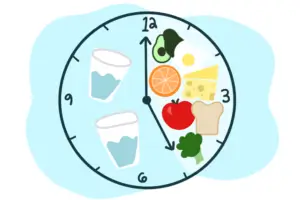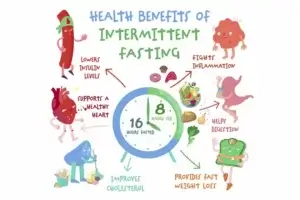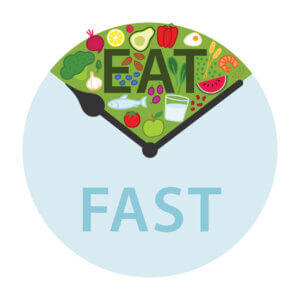Fasting your way to health
Fasting your way to health incorporating fasting can improve your health regime and help detox your body. We are not here to discuss ‘dieting’ or how you can ‘starve your way to health’ but how these simple methods will provide a way to harness your health without having to modify your lifestyle as much. This article delves into the concept of fasting and explores the potential healthcare benefits associated with this approach. Let’s bring this on!
Part 1. What is fasting?
Fasting for health is the method of abstaining from food or drink for a specified period and has been a part of human culture for many centuries. Many people fast for religious or spiritual reasons, while others do it as a way to cleanse their bodies. In recent years, fasting has gained popularity as a potential strategy for improving health and well-being. One particular form of fasting that has received significant attention is intermittent fasting.
It means that calorie intake is restricted only to certain hours of the day, i.e., abstaining from food anywhere between 10 to 12 hours fast.
Our digestive system works throughout the day, and it starts with our first intake of food. The time we do not consume any food, our system goes into self-maintenance. If you now gulp any food, you disrupt the maintenance period.
Whether you are following a Period Fasting or Intermittent Fasting, both aid weight loss and help prevent some aging diseases. So, when you eat is as important as what you eat. Time-restricted eating enhances your metabolism and reduces obesity.

Part 2. Health Benefits of Fasting
The health benefits associated with intermittent fasting have long-term effects and a positive impact on our lifestyle. A few of the health benefits are:
- Weight Loss: Intermittent fasting can be an effective strategy for weight management. Reducing calorie intake and increasing fat oxidation, can help individuals shed excess pounds.
- Metabolic Health: Improved insulin sensitivity, lower blood sugar levels, and reduced risk of type 2 diabetes are some of the metabolic benefits associated with intermittent fasting.
- Heart Health: Studies suggest that intermittent fasting can improve cardiovascular health by reducing risk factors like high blood pressure, cholesterol, and triglycerides.
- Brain or Mental Health: Fasting may promote brain health by enhancing the production of brain-derived neurotrophic factor (BDNF), which supports the growth of new neurons and protects against neurodegenerative diseases.
- Inflammation Reduction: Intermittent fasting may help lower or chronic inflammation markers in the body.
- Longevity: While research on human longevity is ongoing, animal studies have shown that fasting can extend lifespan by promoting cellular repair and reducing oxidative stress.
- Cancer: Some studies have suggested that intermittent fasting might slow down the growth of cancer cells, although research is still needed in this area.

Part 3. What to Eat and How to Fast?
Intermittent fasting helps you reap the benefits of fasting by having smaller meals throughout the day rather than the conventional 3 big meals per day. Stick to fruits, vegetables, lean protein, and healthy fats and limit at maximum, to 800-1000 calories per day.
Low calories equals a high-quality life! Choosing to take your calories during specific days of the week and fasting, cleansing, and renewing your body during the rest is what Periodic Fasting is. A guided low-calorie diet should be preferred for at least 3 days a week. Similar to refurbishing a building, the damaged cells in our body destroy themselves during the period of fasting and rebuild themselves with new fresh, and functional cells. The cells deplete the existing glucose in the form of energy from our food and begin ketogenesis i.e. consuming ketones from our fats. Once you return to your normal diet, the cells receive glucose again and rejuvenate.
Choose your food wisely and have a more healthy and balanced diet! Afterward, decide the type of fasting you want to undergo by considering your pre-set goals for fasting.
Have a clear perspective of what you are going to eat, which is particularly important if you decide to take up ‘calorie-restricted fasting’.
Don’t ignore the signs of your body. If you are not used to fasting, the process might take some time to get used to. For example, if you decide to go for time-restricted fasting, try to start by setting a calorie-free frame of about 8 hours. If a particular fasting does not work for you, try out the other two. You can explore more by shuffling them from time to time.
Incorporating these fasting methods into your eating habits should be, however, first discussed with your doctor, especially if you have some ongoing health concerns. The above-mentioned methods need to be moderated carefully.

Part 4. Is Fasting Good for Everyone?
While fasting can offer numerous healthcare benefits, it may not be suitable for everyone. Consider the following factors before starting your intermittent fasting:
- Health conditions: If you have pre-existing health issues, consult a healthcare professional before starting any form of fasting.
- Pregnancy and breast-feeding: Fasting is generally discouraged during pregnancy and while breastfeeding, as it can affect nutrient intake.
- Eating disorders: Those with a history of eating disorders should avoid fasting, as it can potentially exacerbate these conditions.
- Individual preferences: Intermittent fasting may not align with everyone’s lifestyle or preferences. It’s essential to choose a dietary approach that suits your taste and body cells.
Conclusion
Fasting or even intermittent fasting can be beneficial for a healthy life. Fasting can be helpful for those who want to improve their health and attain a better lifestyle. Over a few years, fasting has gained a lot of popularity for those who wish to reduce their weight and enhance brain function. It is important to know which fasting routine will be beneficial according to your body, what to eat, and how to fast. However, fasting for health is worth doing for those who want to optimize their well-being.
